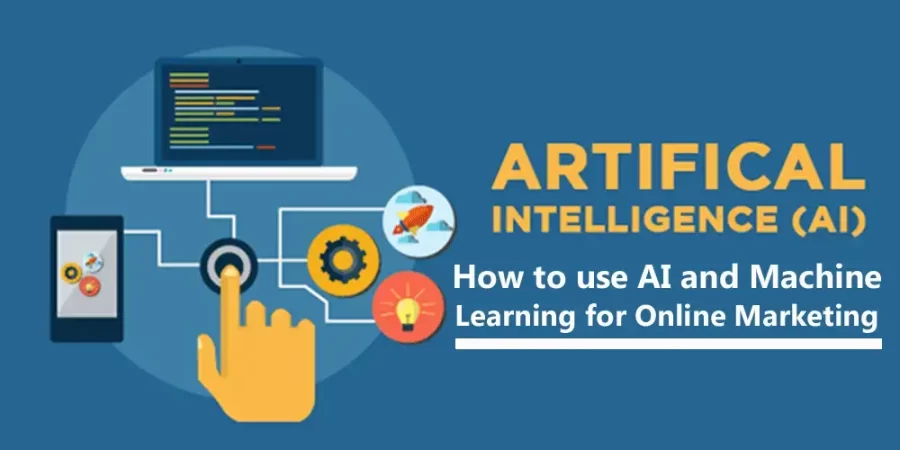Beginners Guide: How To Use AI And Machine Learning For Online Marketing?
Online marketing is the process of promoting a business or product through various digital channels such as social media, search engines, and email. Artificial intelligence (AI) and machine learning (ML) are powerful tools that can be used to enhance and optimize online marketing efforts. In this article, we will explore some of the ways that AI and ML can be used for online marketing and provide tips for getting started.
One of the most popular ways to use AI and ML in online marketing is through the use of chatbots. Chatbots are computer programs that can simulate conversation with human users. They can be integrated into websites, social media platforms, and mobile apps to provide customer service, answer frequently asked questions, and even make sales.
One of the key benefits of chatbots is their ability to understand natural language, which allows them to communicate with customers in a more human-like way. This makes them more effective at engaging customers and guiding them through the sales process. Additionally, chatbots can be trained to improve their performance over time by using ML algorithms to analyze customer interactions and learn from their behavior.
Another way to use AI and ML in online marketing is through the use of predictive analytics. Predictive analytics involves using data and statistical models to identify patterns and predict future outcomes. This can be used to optimize online marketing campaigns by identifying the most effective strategies and targeting the right audience.
For example, predictive analytics can be used to analyze customer data to identify patterns in their behavior and predict which customers are most likely to make a purchase. This can help businesses target their marketing efforts more effectively, resulting in higher conversion rates and better ROI. Additionally, predictive analytics can be used to analyze website traffic data to identify which pages are most effective at converting visitors into customers, and which pages need improvement.
AI and ML can also be used to optimize search engine optimization (SEO). SEO is the process of improving a website’s visibility in search engine results pages (SERPs) by optimizing its content and structure. AI-powered tools such as natural language processing (NLP) can be used to analyze website content and identify keywords that are most relevant to the target audience. Additionally, ML algorithms can be used to analyze website data and identify patterns that can be used to improve the website’s visibility in SERPs.
One of the most popular ways to use AI in online marketing is through the use of recommendation systems. Recommendation systems use data and algorithms to make personalized recommendations to users based on their past behavior and preferences. For example, a recommendation system can be used to suggest products or content to customers based on their past purchases or browsing history.
Recommendation systems can be used to improve the customer experience by providing personalized and relevant recommendations, which can increase engagement and drive sales. Additionally, recommendation systems can be used to analyze customer data to identify patterns in their behavior and predict which customers are most likely to make a purchase. This can help businesses target their marketing efforts more effectively, resulting in higher conversion rates and better ROI.
AI and ML are powerful tools that can be used to enhance and optimize online marketing efforts. By using chatbots, predictive analytics, SEO, and recommendation systems, businesses can improve customer engagement, increase conversion rates, and drive sales. However, it is important to note that the implementation of AI and ML in online marketing requires proper planning, and it is important to understand the implications of these technologies before implementation. With the right approach, AI and ML can be a valuable addition to any online marketing strategy.
Another important aspect of online marketing that can be enhanced with AI and ML is personalization. Personalization is the process of tailoring the customer experience to individual preferences and needs. With the help of AI and ML, businesses can analyze customer data and create personalized experiences that are more relevant and engaging.
For example, AI and ML can be used to create personalized email marketing campaigns. By analyzing customer data such as purchase history, browsing behavior, and email engagement, businesses can create targeted email campaigns that are more likely to resonate with individual customers. Personalized email campaigns have been shown to have higher open and click-through rates, resulting in better ROI for businesses.
In addition, AI and ML can be used to create personalized content and product recommendations on websites and mobile apps. By analyzing customer data, businesses can create targeted content and product recommendations that are more likely to resonate with individual customers. This can improve the customer experience, increase engagement, and drive sales.
Social media is another area where AI and ML can be used for online marketing. Social media platforms such as Facebook, Twitter, and Instagram have vast amounts of data on their users, including demographics, interests, and behavior. AI and ML can be used to analyze this data and create targeted social media campaigns that are more likely to resonate with individual users.
For example, businesses can use AI and ML to analyze social media data to identify the most effective times to post content, the most effective types of content, and the most effective targeting strategies. This can help businesses create social media campaigns that are more likely to reach the right audience and drive engagement. Additionally, businesses can use AI and ML to analyze social media data to identify influencers and key opinion leaders, who can help amplify their message and reach a wider audience.
AI and ML can also be used to create more effective online advertising campaigns. By analyzing customer data and website traffic data, businesses can create targeted online advertising campaigns that are more likely to reach the right audience and drive engagement. For example, businesses can use AI and ML to analyze data on customer behavior and interests to create targeted online advertising campaigns that are more likely to resonate with individual customers. Additionally, businesses can use AI and ML to analyze website data to identify the most effective placements for online advertising, resulting in better ROI.
Here are some key takeaways from the article on “How to use AI and machine learning for online marketing”:
- Chatbots: AI and ML can be used to create chatbots that can simulate conversation with human users. They can be integrated into websites, social media platforms, and mobile apps to provide customer service, answer frequently asked questions, and even make sales. Chatbots can understand natural language and communicate with customers in a more human-like way, making them more effective at engaging customers and guiding them through the sales process. Additionally, chatbots can be trained to improve their performance over time by using ML algorithms to analyze customer interactions and learn from their behavior.
- Predictive analytics: AI and ML can be used to analyze customer data and predict future outcomes, which can be used to optimize online marketing campaigns. Predictive analytics can identify patterns in customer behavior, and predict which customers are most likely to make a purchase, helping businesses to target their marketing efforts more effectively, resulting in higher conversion rates and better ROI. Additionally, predictive analytics can be used to analyze website traffic data to identify which pages are most effective at converting visitors into customers and which pages need improvement.
- SEO: AI and ML can be used to optimize SEO by analyzing website content and identifying relevant keywords. Additionally, ML algorithms can be used to analyze website data and identify patterns that can be used to improve the website’s visibility in search engine results pages.
- Recommendation Systems: AI and ML can be used to create personalized recommendations to users based on their past behavior and preferences. For example, a recommendation system can be used to suggest products or content to customers based on their past purchases or browsing history. Recommendation systems can improve the customer experience by providing personalized and relevant recommendations, which can increase engagement and drive sales.
- Personalization: AI and ML can be used to create personalized experiences that are more relevant and engaging. By analyzing customer data, businesses can create targeted email campaigns, content and product recommendations that are more likely to resonate with individual customers, improving the customer experience and increasing engagement and sales.
- Social media: AI and ML can be used to analyze social media data to create targeted social media campaigns that are more likely to resonate with individual users, increasing engagement and reach. Additionally, AI and ML can be used to identify influencers and key opinion leaders who can help amplify the business message and reach a wider audience.
- Online Advertising: AI and ML can be used to create more effective online advertising campaigns by analyzing customer data and website traffic data. Businesses can create targeted online advertising campaigns that are more likely to reach the right audience and drive engagement. AI and ML can be used to analyze data on customer behavior and interests to create targeted online advertising campaigns, and website data to identify the most effective placements for online advertising, resulting in better ROI.
- AI-powered customer segmentation: AI and ML can be used to analyze customer data and segment them into different groups, based on their behavior and demographics. This allows businesses to create targeted marketing campaigns that are more likely to resonate with specific customer segments, resulting in better engagement and sales.
- AI-powered product optimization: AI and ML can be used to analyze customer data and product data to identify which products are most popular and which features are most important to customers. This can help businesses optimize their product offerings to better meet the needs of their target audience, resulting in increased sales and customer satisfaction.
- AI-powered demand forecasting: AI and ML can be used to analyze customer data and sales data to predict future demand for products and services. This can help businesses plan their inventory and production schedules more effectively, resulting in better supply chain management and cost savings.
- AI-powered fraud detection: AI and ML can be used to analyze customer data and transactions data to identify patterns and anomalies that may indicate fraudulent activity. This can help businesses detect and prevent fraud, resulting in cost savings and improved customer trust.
- AI-powered customer service: AI and ML can be used to create automated customer service systems that can understand natural language and provide accurate and efficient responses to customer inquiries. This can help businesses improve their customer service and reduce the need for human customer service representatives, resulting in cost savings and improved customer satisfaction.
- AI-powered image and voice recognition: AI and ML can be used to analyze images and voice data to identify patterns and recognize specific individuals. This can be used to create more engaging and personalized customer experiences, such as personalized product recommendations based on customers’ images or personalized voice-enabled customer service.
In conclusion, AI and ML can be used to enhance and optimize many aspects of online marketing, including chatbots, predictive analytics, SEO, recommendation systems, personalization, social media, and online advertising.
Additionally, AI and ML can also be used for other aspects of online marketing such as customer segmentation, product optimization, demand forecasting, fraud detection, customer service, and image and voice recognition.
However, it is important to note that the implementation of AI and ML in online marketing requires proper planning and execution. Businesses must have a clear understanding of their target audience and goals, as well as the implications of these technologies before implementation. With the right approach, AI and ML can be a valuable addition to any online marketing strategy.





Leave a Reply